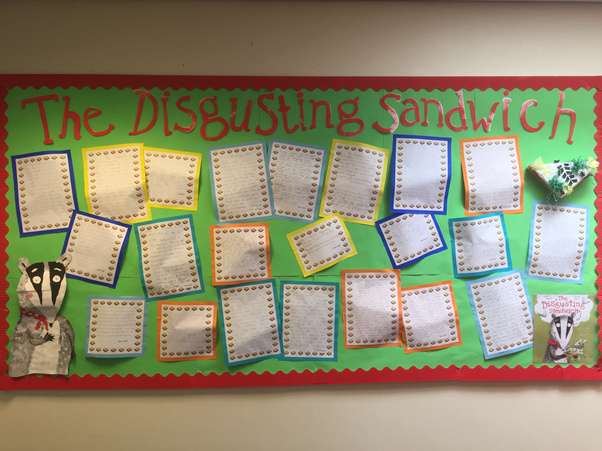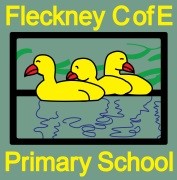English

At the bottom of this page you can click on each year group's individual English planning and class texts.
How do we teach Writing at Fleckney School?
Aims
Our aims in Writing:
We adopt a consistent approach to writing across the school. There are two distinct areas of focus:
- Transcription (spelling and handwriting)
- Composition (articulating ideas and structuring them in speech and writing)
Planning and Delivery
Spelling
Spelling is taught across the school within in daily sessions, undertaken in ability groups.
In KS1 we follow the Little Wandle – Letters and Sounds Revised phonics and spelling scheme which continues into lower Key Stage Two, and then we transition to the Read, Write Inc programme. Lessons are structured to introduce, investigate and practise word patterns as well as common exception words/tricky words and orange words (statutory words). Handwriting Across the school, handwriting is taught both discretely and frequently in lessons and also embedded across the curriculum. Children use our chosen pre-cursive and cursive style and font once they are confident forming their lower case and upper case letters correctly.
Writing
Writing in the Foundation Stage - We have a great emphasis on Physical Literacy. The children use gross motor movements in mark marking both in and outside the classroom. These sessions are carefully designed to support the children with their gross motor skills so that they can move onto developing their fine motor skills. For example, programmes such as ‘Write Dance’ are effectively employed from the Autumn term onwards. In addition, writing is closely incorporated into our role play area with children writing at every opportunity and also in our continuous writing area, where various writing tools are explored and introduced throughout the year. The children explore writing in many different forms - for example: writing a list of food in a shop or writing a postcard to their family.
Writing in KS1 - In Key Stage One, the children develop the skills learnt in the FS and become independent, creative and skilful writers. The children are introduced to sentences and basic punctuation. They are encouraged to say a sentence before writing it down and use the graphemes that they have learnt to aid their spelling. As they progress through Key Stage One, they learn and apply more graphemes explored in our phonics lessons and also become fluent in writing the common exception words for Year 1 and 2. Punctuation such as commas, exclamation marks, speech marks and question marks are introduced and the children begin to use them in their writing. The children write in many forms throughout Key Stage One, including fiction and nonfiction, from lists, labels and captions, recounts and poetry to narratives and instructions. They enhance their work by varying sentence structure, using conjunctions and adverbs, and making interesting and exciting word choices. With support, they are able to read through what they have written, editing where required.
Writing in KS2 - In KS2, children develop their skills further by exploring an increasing range of genres, with a focus on exploring a range of models of excellence and using these to guide the drafting and editing process. Children are encouraged to develop a sophisticated bank of vocabulary – this is done by sharing high quality texts, thesaurus work, and ‘word’ of the day’ activities. Writing techniques are developed through a grammar-focused approach to composition. This emphasis on grammar ensures that the ‘mechanics of writing’ are taught methodically and children make good progress throughout their journey in KS2. When teaching sentence construction, children are encouraged to orally rehearse their sentences and use actions to represent key punctuation. Whilst the understanding and application of spelling, grammar and punctuation in writing is fundamental (and very much a focus at Fleckney), creativity is also encouraged. It is our firm belief that it is the combination of all these components which help to achieve excellence in writing.
The impact of the writing curriculum is measured by a variety of methods:
- A reflexion of standards achieved against the planned outcomes.
- Children’s development of an author’s voice.
- Internal and external moderation.
- Involvement in ‘Assessing Primary Writing’ (national moderation and assessment).
- Termly spelling, punctuation and grammar assessments.
- Children’s ability to communicate effectively to a wider audience (i.e. school newsletter articles, national competitions, participation in national and international campaigns).
- A celebration of learning – Star writer.
- Children’s confidence to draft, edit and publish their writing with increasing independence and accuracy.
How do we teach Reading at Fleckney School?
Supporting Parents with reading - Phonics video
Aims
We adopt a consistent approach to reading across the school. There are three distinct areas of focus:
- Decoding (including phonics)
- Reading skills (all aspects of comprehension)
- Promoting a ‘love of reading’ and enjoyment of books
Our whole school provides the pupils with a language rich environment enabling pupils to access reading of different types on a daily basis. All pupils are given the opportunity to ‘share’ books with others. Book Talk is a whole class reading approach which is used throughout the school. Book Talk sessions focus on ways to teach the mechanics of reading and the magic of the written word. Our Book Talk sessions are supplemented by our weekly reading lesson aided by our comprehension scheme ‘Complete Comprehension’ through which we teach the children about the key skills for reading including prediction, inference, sequencing, word meaning and retrieval.
Planning and Delivery
We believe that all our children can become fluent readers and writers. This is why we teach reading through Little Wandle Letters and Sounds Revised, which is a systematic and synthetic phonics programme. We start teaching phonics in The Foundation Stage and follow the Little Wandle Letters and Sounds Revised progression, which ensures children build on their growing knowledge of the alphabetic code, mastering phonics to read and spell as they move through school.
Phonics in The Foundation Stage and Key Stage One
We provide a balance of child-led and adult-led experiences for all children that meet the curriculum expectations for ‘Communication and language’ and ‘Literacy’. These include:
- Sharing high-quality stories and poems
- Learning a range of nursery rhymes and action rhymes
- Activities that develop focused listening and attention, including oral blending
- Attention to high-quality language.
We teach phonics for 30 minutes a day. In the Foundation Stage, we build from 10-minute lessons, with additional daily oral blending games, to the full-length lesson as quickly as possible. Each Friday, we review the week’s teaching to help children become fluent readers.
Children make a strong start in the Foundation Stage: teaching begins in Week 2 of the Autumn term.
We follow the Little Wandle Letters and Sounds Revised expectations of progress.
Children in the Foundation Stage are taught to read and spell words using Phase 2 and 3 GPCs, and words with adjacent consonants (Phase 4) with fluency and accuracy.
Children in Year 1 review Phase 3 and 4 and are taught to read and spell words using Phase 5 GPCs with fluency and accuracy. Any child who needs additional practice has daily Keep-up support, taught by a fully trained adult. Keep-up lessons match the structure of class teaching, and use the same procedures, resources and mantras, but in smaller steps with more repetition, so that every child secures their learning.
Group Reading Practice Sessions in FS + KS1
We teach children to read through reading practice sessions three times a week. These:
- Are taught by a fully trained adult to small groups of approximately six children
- Use books matched to the children’s secure phonic knowledge using the Little Wandle Letters and Sounds Revised assessments and book matching grids on pages 11–20 of ‘Application of phonics to reading’
- Are monitored by the class teacher, who rotates and works with each group on a regular basis.
Each reading practice session has a clear focus, so that the demands of the session do not overload the children’s working memory. The reading practice sessions have been designed to focus on three key reading skills:
- Decoding
- Prosody: teaching children to read with understanding and expression
- Comprehension: teaching children to understand the text.
In the Foundation Stage these sessions start in Week 4. Children who are not yet decoding have daily additional blending practice in small groups, so that they quickly learn to blend and can begin to read books.
In Year 2, 3 and 4, we continue to teach reading in this way for any children who still need to practise reading with decodable books.
Individual Reading Books
We use a range of National banded texts books for individual reading. These include Big Cat, Oxford Reading Tree and Rigby, as well as many books by famous, unknown and exciting authors.
In the Foundation Stage and Key Stage One, the children are allocated a Blend book (their Little Wandle Group Reading book that they take home at the end of the week to share) and a Branch Out book (matched to the children’s reading level and to be shared with an adult at home). We also have a wide range of picture and chapter books for the children to explore in class libraries each day.
In Key Stage 2 If any child has gaps in their phonic knowledge when reading or writing, we plan phonics ‘Rapid Catch-up’’ lessons to address specific reading/writing gaps. These short, sharp lessons last 10 minutes and alongside reading sessions, take place every day and are produced by our Little Wandle ‘Letters and Sounds Revised’ scheme.
We still encourage all readers to share a book at home with their grown-ups. We believe that this not only helps to develop inferential skills, but also supports a lifelong love of reading.
Teaching Reading across the school
We value reading for pleasure highly and work hard as a school to grow our Reading for Pleasure pedagogy.
- We read to children every day. We choose these books carefully as we want children to experience a wide range of books, including books that reflect the children at Fleckney Primary School and our local community as well as books that open windows into other worlds and cultures.
- Every classroom has an inviting book corner that encourages a love for reading. We curate these books and talk about them to entice children to read a wide range of books.
- Children from the Foundation Stage onwards have a home reading record. The parent/carer records comments to share with the adults in school and the adults will write in this on a regular basis to ensure communication between home and school. These records are checked weekly by staff.
- As the children progress through the school, they are encouraged to write their own comments and keep a list of the books/authors that they have read.
- Each class visits the local library every year.
- The school library is made available for classes to use at protected times. Children across the school have regular opportunities to engage with a wide range of Reading for Pleasure events (book fairs, author visits and workshops, national events etc).
Whole school support
- Little Wandle Phonics and Spelling scheme from FS to KS1 and across KS2.
- Cross phase reading buddies (collaborative learning)
- Reading Lounge
- KS2 Book Talk Resources organised and accessible in Reading Lounge
- School library timetable slots for all classes
- Scheduled visits to Fleckney Library
- Twice yearly Scholastic Book Fairs
- Picture Book Project (local schools project to raise profile of picture across all phases in Primary AND link work on Values and Character.
- Termly Reading Bulletin sent to parents
- Staff book recommendations shared with pupils and parents
- Reading Rainbow display board and flashcards in ALL classrooms (Book Talk)
